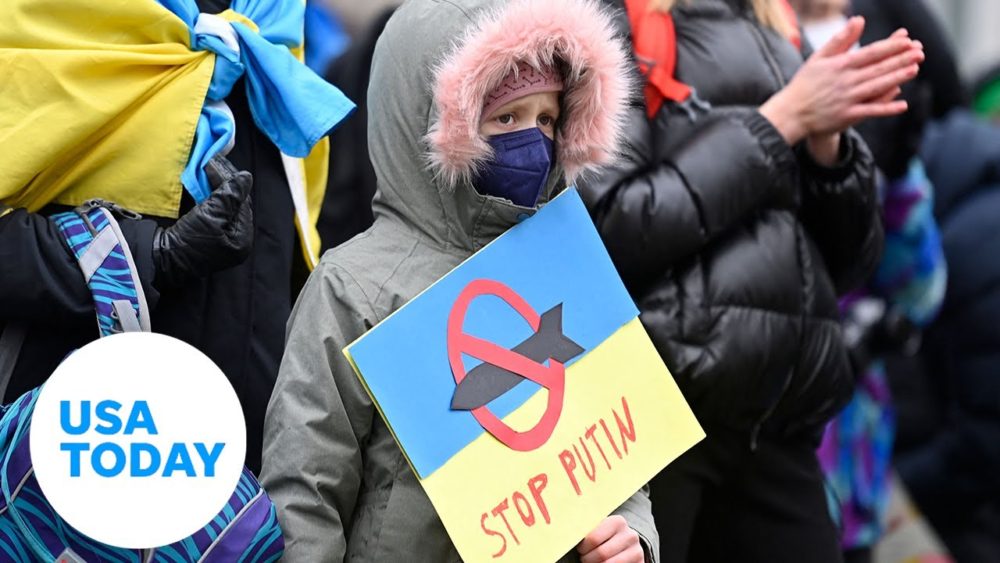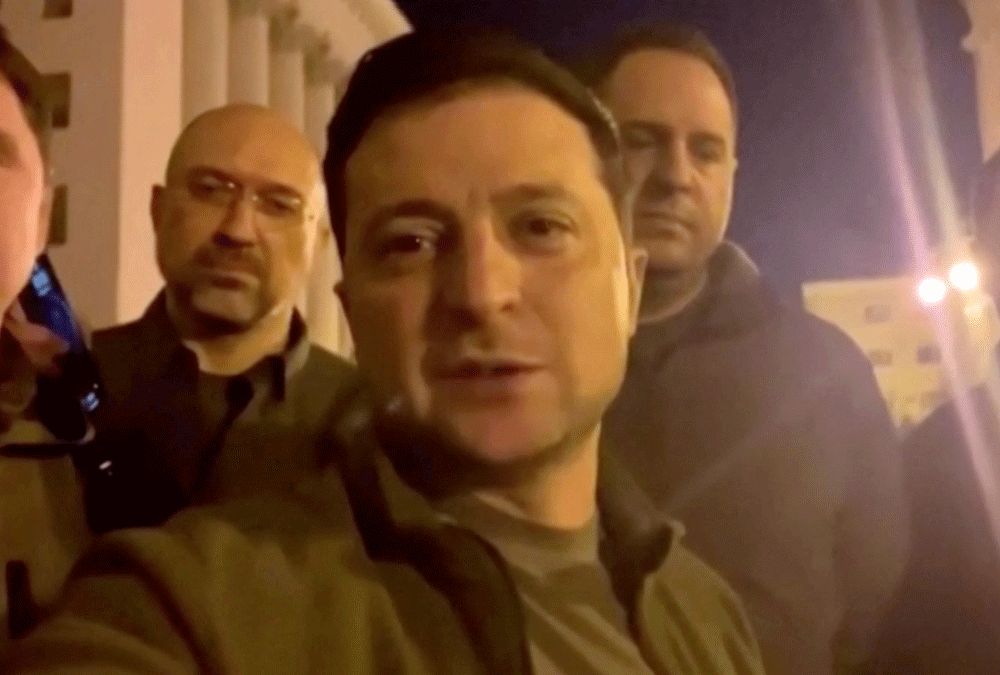他向选民兜售自己是“乌克兰的普通人”(Ukrainian Everyman),决心结束俄罗斯在东部支持的战争和政府中的系统性腐败。弗拉基米尔·泽伦斯基(Volodymyr zelensky)在政界是一张新面孔,但在电视上却是一张熟悉的面孔。2019年,这位前喜剧演员以73%的得票率成为乌克兰第六任总统。
今天,泽伦斯基坚定不移地领导着他的国家经历战争。
尽管有风险,这位44岁的总统还是采取了最后的立场,他一直在基辅街头反抗入侵他国家的俄罗斯军队。周五上午,泽伦斯基在一段发给乌克兰人的视频中说,敌人已经确定他是头号目标,他的家人是二号目标。
据报道,在前一天晚上的电话会议上,他告诉欧盟领导人,“这可能是你们最后一次看到我活着。”
美国政府已经提出并准备帮助泽伦斯基离开这个国家,但到目前为止,他一直拒绝。在欧洲自二战以来规模最大的地面战争中,超过19万名俄罗斯军队进攻乌克兰,而就在几个小时前,美国警告基辅可能很快就会沦陷,泽伦斯基承诺留在首都。他说,他将留在“中央政府工作需要的每一个人身边”。

虽然从表面上看,他可能不像是一位战时领导人,但专家们说,他从政的时间很短,这可能让他觉得有必要毫不动摇地保卫国家,并采取他大胆的领导策略,而这是职业政治家可能会回避的。
麦吉尔大学(McGill University)专攻欧洲政治的政治学副教授玛丽亚•波波娃(Maria Popova)表示,人们可能会对泽伦斯基的决心感到惊讶,因为俄罗斯认为乌克兰不是一个真正的国家。
“乌克兰人渴望独立,他们愿意为独立而战,”她说。“所以,泽伦斯基采取这种立场并不奇怪,因为他是乌克兰人。”
波波娃说,考虑到泽伦斯基和俄罗斯总统普京的领导风格,他们唯一的共同点是都依赖某种魅力。她说,泽伦斯基的观点是基于他的民主合法性。他是由乌克兰公民选举出来的,为能代表他们、为他们说话而感到自豪。普京的魅力是家长式的。波波娃说,这是基于他将照顾俄罗斯人民的想法,并告诉他们需要做什么。
她说:“他是把决策强加于人的决策者,即使是对他最亲近的人,他也不听取他们的建议,而是告诉他们需要做什么。”
当然,两位领导人的政治经历也有所不同。
波波娃强调说,泽伦斯基当上总统时是个政治新手。他拥有基辅国立经济大学的法律学位,但因在乌克兰政治讽刺电视连续剧《人民公仆》中扮演的角色而广为人知。

基辅之战:在乌克兰首都,市民们拿起武器
四年来,泽伦斯基扮演的是一名高中历史教师,在一段批评政府腐败的视频在网上疯传后,他被推入政坛,当选乌克兰总统。为了国家的发展,他的性格挑战着政客和见不得光的商人。当泽伦斯基2018年竞选乌克兰总统时,他是作为人民公仆党(Servant of the People Party)的一员参加竞选的,该党是他创立的,并以该节目命名。
波波娃说,泽伦斯基的表演和制作电视节目的背景影响了他的领导风格。他习惯于站在镜头前,这使他能够自信地讲话,并与观众建立良好的关系。
在俄罗斯入侵之前,泽伦斯基已经开始利用社交媒体的力量,通过视频与他的人民和敌人沟通。在2月24日发布的一篇帖子中,他恳求俄罗斯人民停止向乌克兰派遣军队。他强调了他们之间的密切联系,并警告说战争即将爆发。
泽伦斯基用俄语说:“你们被告知这是一个解放乌克兰人民的计划。”“但乌克兰人民是自由的。”
波波娃说,在社交媒体上发布视频是泽伦斯基与俄罗斯民众交流的唯一方式。他知道普京政府控制着媒体,所以在Facebook和Twitter等网站上发帖是他唯一的选择。
周五晚上,泽伦斯基在Facebook上与乌克兰人和俄罗斯人进行了交谈。在俄罗斯媒体流传他已经逃离基辅的谣言后,泽伦斯基在社交媒体网站上发布了一段视频,视频显示他和高级政府领导人公然站在首都的街道上,标题是:“我们在这里,我们在基辅,我们誓死捍卫乌克兰。”

在另外一段视频中,泽伦斯基说,西方国家只是远远的看着,没有人出手,我们只有孤军奋战,才能保卫自己的家园。
乌克兰本来是有核武器的国家,在苏联解体后,乌克兰当时是全球第三大核弹占有国,联合国为了让乌克兰弃核,五大常任理事国包括俄罗斯在内,一致承诺会保证乌克兰的安全,所有这些国家在布达佩斯签署了该协议。但是,现在首先攻打乌克兰的就是俄罗斯,其他四个常任理事国袖手旁观,有的只放嘴炮,有的和俄罗斯沆瀣一气。估计乌克兰人民现在最想说的就是:千不该万不该,不应该相信这帮国际“小丑”!我们如果有大量的核武器,他普金敢贸然入侵我们的家园?现在,我们的喜剧演员变成了乌克兰人民的英雄,而那些西方大国和签署该协议的某大国变成了真正的“小丑”!
(以下是英文报道的原文,以上是参考译文)
He sold himself to voters as the Ukrainian Everyman, determined to put an end to the Russian-backed war in the east and systemic corruption in government. Volodymyr Zelenskyy was a new face in politics, but a familiar one on television, and in 2019 the former comedian swept to power as Ukraine’s sixth president with 73 per cent of the vote.
Today, Zelenskyy is steadfast as he leads his country through war.
Despite the risk, the 44-year-old president has taken his last stand and has been on the streets of Kyiv in defiance of the Russian troops that are invading his country. On Friday morning, in a video addressed to Ukrainians, Zelenskyy said that he has been identified by the enemy as the number one target and his family as the number two.
This came after a conference call the night before on which he reportedly told European Union leaders, “This might be the last time you see me alive.”
The U.S. government has offered and is prepared to help Zelenskyy leave the country, but so far, he has refused. As more than 100,000 Russian troops attack Ukraine in the largest ground war in Europe since World War Two, and just hours after he was warned by the U.S. that Kyiv could soon fall, Zelenskyy pledged to remain in the capital city. He said he would be staying “with everyone who is needed for the work of the central government.”
While he may appear on the surface to be an unlikely wartime leader, experts say his short time in politics may be what has allowed him to feel the need to unwaveringly defend his country and adopt his bold leadership strategy, something a career politician may shy away from.
Maria Popova, associate professor of political science at McGill University with a specialization in European politics, said that people may be surprised by Zelenskyy’s determination because of the Russian narrative that Ukraine is not a real nation.
“Ukrainians are attached to their independence, and they’re willing to fight for it,” she said. “So, it’s not surprising that Zelenskyy is taking this position, because he is a Ukrainian.”
When considering the leadership styles of Zelenskyy and Russian President Vladimir Putin, Popova said the only commonality they share is that they both rely on a kind of charisma. Zelenskyy’s is based on his democratic legitimacy, she said. He was elected by Ukrainian citizens and is proud to represent them and speak for them. Putin’s charisma is paternalistic. Popova said it is based on the idea that he will take care of the Russian population and tell them what needs to be done.
“He is the decision-maker who imposes decisions, even on those closest to him, not taking advice from them, but telling them what they need to do,” she said.
Of course, the two leaders also differ in their political experience.
Zelenskyy was a political novice when he became president, emphasized Popova. He holds a degree in law from the Kyiv National Economic University but is overwhelmingly known for his role on the Ukrainian political satire television series Servant of the People.
For four years, Zelenskyy played a high school history teacher that was thrust into politics and elected president of Ukraine after a video of him criticizing government corruption went viral. His character challenges politicians and shady businessmen for the betterment of his country. When Zelenskyy ran for the actual role of president of Ukraine in 2018, he did so as part of the Servant of the People Party, which he founded and named after the show.
Popova said that Zelenskyy’s background in acting and producing a television show has affected his leadership style. He is used to being in front of the camera which allows him to speak confidently and develop a good rapport with viewers.
Before the Russian invasion had begun, Zelenskyy had already started using the power of social media to communicate with his people, and his enemies, through videos. In one posted on Feb. 24 he pleaded with the Russian people to stop their leadership from sending troops into Ukraine. He stressed their close ties and warned of the war to come.
“You are being told this is a plan to free the people of Ukraine,” said Zelenskyy in Russian. “But the Ukrainian people are free.”
Posting videos on social media is the only way Zelenskyy can speak with the Russian population, said Popova. He knows that Putin’s government controls the media, so posting on sites like Facebook and Twitter is his only option.
On Friday evening, Zelenskyy spoke to Ukrainians and to Russians on Facebook. After rumours spread by Russian media that he had fled Kyiv, Zelenskyy posted a video to the social media site which showed him and top government leaders standing defiantly in the streets of the capital city with the caption: “We’re in here. We are in Kyiv. We defend Ukraine.”
— with additional reporting from The Washington Post


